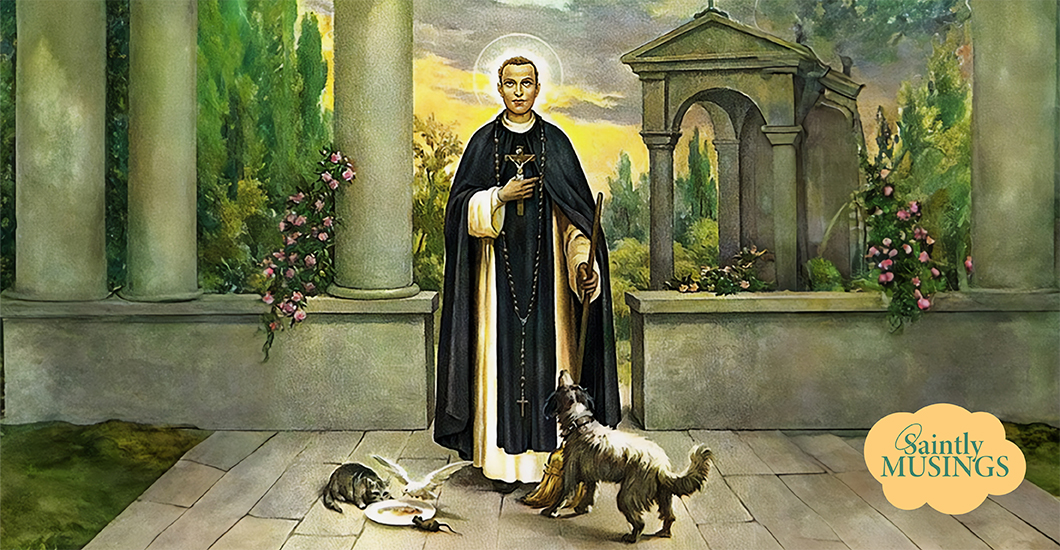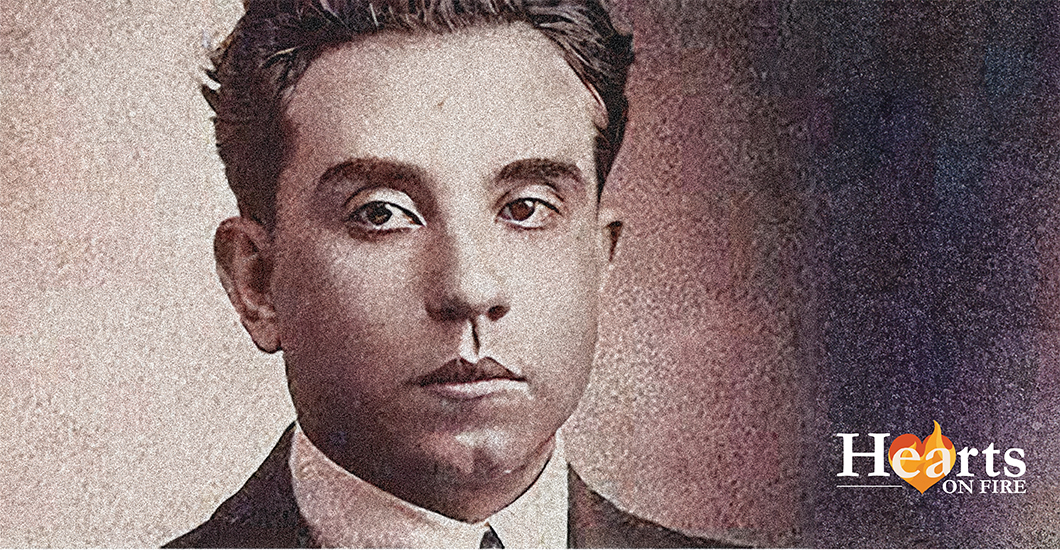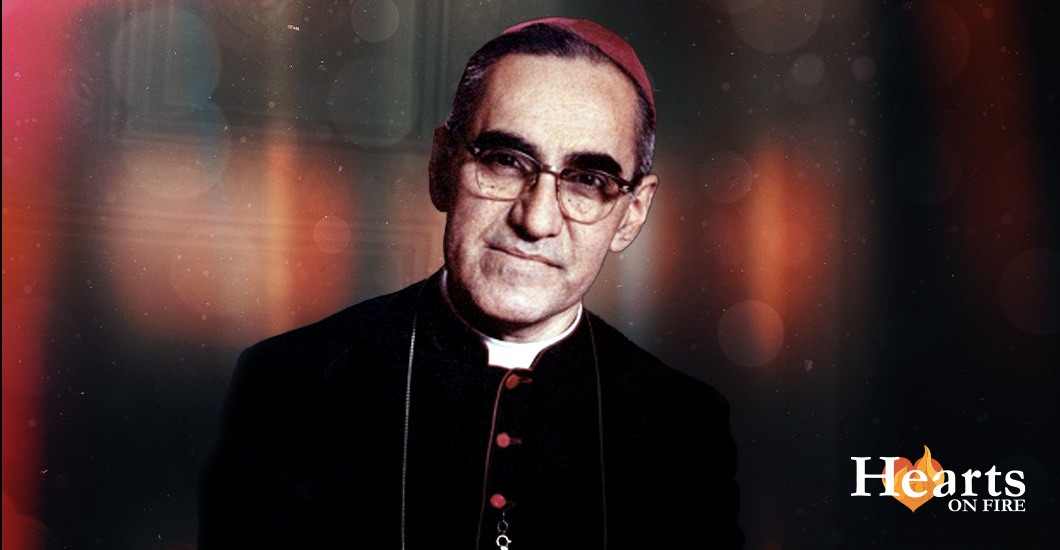Home/Evangelize/Article
Trending Articles
The Advent Challenge
Baby Jesus, peacefully nestling in His parents’ hands…it’s a beautiful image that has been reproduced in so many forms over the centuries. My personal favorite is a sleeping Mary with Joseph by the side, lovingly looking at the child in his arms.
Throughout the scary journey to an unknown land, Mary and Joseph would have done all they could to make sure that the baby they held close felt safe. They knew that this was The Savior who had come to save the world, and so, in spite of all the struggles, they sacrificed their joys for the child.
Jesus taught us to see Him in the person next to us. In fact, didn’t He come down to raise us to Him?
Every Advent, I am posed with the challenge of seeing Christ in others.
When I look at the person next to me, I wish I could see beyond the surface–his/her color, race, position, power, ugly scars, to reveal the true beauty within—the image of the Savior reflected deep within their soul. What helps me is to first take a look at myself, to recognize my weaknesses and sinful ways, and be amazed at the fact that God still loves me. If He can see beyond all these, to the possibility of who He created me to be, He can surely help me see the same Christ-like beauty in my fellow brethren.

Maria Teres Sebastian is a passionate young writer who aspires to spend her time and skills for the glory of God. She lives in Kerala, India.
Related Articles
I remember a childhood story in which God, about to destroy Earth because of humanity's wrongdoing, looked down, saw the lilies of the field praying for mankind, and extended the end of time. It was my wife's desire to attend daily Mass that led us to the nearby Carmelite Monastery. I was immediately struck by the pervasive stillness and a sense of tranquility. Through the grilled gates, these nuns looked like God's lilies on earth. As I was introduced to their daily life, I was surprised to learn that the sisters make vestments, altar breads, and greeting cards. They even stitch their own habits, grow their own fruits and vegetables, and look after the other elderly sisters. Most of the day is spent in silence, which helps them to open up to the Lord and pray. The sisters even meet up twice a day to talk and share. The power of prayer and its impact dawned upon me. The Church has a rich tradition of prayer, through which we deeply connect with God, whether it's through attending Mass, reciting the Rosary, or simply taking a few moments to reflect on God's presence in our lives. The experience of visiting the Carmelite Monastery was truly humbling. It helped me reflect on the power of prayer and the importance of dedicating one's life to serving others, and left me with a sense of peace and renewed faith.
By: Winner Varghese
MoreAs Catholics, we have heard from the time we were little: “Offer it up.” From a little headache to a very serious emotional or physical hurt, we were encouraged to ‘offer it up.’ It wasn't until I was an adult that I pondered the meaning and purpose of the phrase, and understood it as ‘redemptive suffering.’ Redemptive suffering is the belief that human suffering, when accepted and offered up in union with the Passion of Jesus, can remit the just punishment for one's sins or the sins of another. In this life, we are going to suffer various minor and major physical, mental, emotional, and spiritual trials. We can choose to grumble about it or we can surrender it all and unite our suffering with Jesus’ Passion. It can be redemptive not only for us, we can even help someone open their heart to receive Jesus' healing and forgiveness. We may never know in this life how offering up our sufferings has helped someone else break free of the bondages that have held them for so long. Sometimes, God allows us to experience the joy of seeing someone break loose from a life of sin because we offered up our suffering for them. We can offer up our sufferings even for the poor souls in purgatory. When we finally arrive in Heaven, imagine those we were praying for and offering up our sufferings greeting us and thanking us. Redemptive suffering is one of those areas that can be difficult to fully understand, but when we look at Scripture and what Jesus taught and how his followers lived, we can see that it is something that God is encouraging us to do. Jesus, help me each day to offer up my little and big sufferings, difficulties, annoyances, and unite them to You on the Cross.
By: Connie Beckman
MoreA blaring home siren was ripping through the stillness of the night. I woke up with a start. My first instinct was one of frustration, but as the moments passed and the siren continued wailing across the neighborhood, I realized there was something amiss. More from curiosity than bravado, I went outside to get a better look. Seeing my neighbor John working under the hood of his car, I called out and asked about the siren, but he seemed not to hear it at all. He simply shrugged: “Those things go off all the time…it’ll turn itself off in a few minutes.” I was confused. “But what if someone is breaking into the house?” “Well, if they have their alarm serviced by the alarm company, someone will come around in a little bit to check on it. But it’s probably just nothing. Like I said, they go off all the time for the craziest reasons. Lightning storms, a car backfire...who knows why?” I went back into my house and looked at the alarm panel on the wall near our front door. What good is an alarm if no one pays any attention? How often is the Gospel message heard across our neighborhoods and our cities like a voice crying in the wilderness, an alarm warning of impending danger echoing through the night? “Turn back to God,” it exhorts. “Repent. Ask for His forgiveness.” Yet many of us just shrug our shoulders, turn away, and continue fiddling under the hoods of our cars, content with our lifestyle, relationships, and comfort zones. “Hey, don’t you hear it?” Every now and then someone interrupts. The response would probably be: “Been hearing it ever since I was a kid. But don’t worry, it’ll turn itself off in a few minutes.” “Seek the Lord while He may be found. Call upon Him while He is near.” (Isaiah 55:6)
By: Richard Maffeo
More‘Set a timer for five minutes and thank God for this person.’ I bet you are wondering what on earth I’m talking about. Sometimes, we forget to talk to God about unsettled situations regarding the people God places in our lives. Many times, I forget this. One day, by God’s grace, I chose to do something about the lack of peace in my heart. Several years ago, I was having a difficult time with someone in my life. I’ll skip the details. My problem was that it really bothered me. Have you ever been in a situation like this? I made a decision to talk to a priest about it and went to Confession. After he heard my confession, the priest gave me absolution and my penance. Guess what my penance was? If you said ‘set a timer,’ you are absolutely right! He said: “I want you to spend five minutes thanking God for this person.” Five Minutes Five Minutes? Yikes! Determined, I said to myself, I can do this. I left the Church and went to my car. I set my watch for five minutes, and immediately, I was stuck. Wow, this is really difficult! Slowly, I found little ways to thank God for this person. I checked my watch…ugh, only one minute passed. I continued to pray with all my heart. I want to do this! Again, I began thanking God. As the minutes slowly passed by, it became easier and easier. My five minutes still wasn’t up. Continuing with a renewed sense of determination, I found myself thanking God even for the small difficulties. Inside, my heart was leaping! Praying for this person was really working to change my heart. Why was I so consumed by these difficulties? This is really a good person. Remembering I often remember that day. When I face difficulties with someone, I attempt to apply what I learned from that particular penance. Do you remember the promise made when we recite the Act of Contrition? Those final words before we are absolved from our sins? “… I firmly resolve, with the help of Thy grace, to confess my sins, do penance, and amend my life. Amen.” Now, when I find myself ruminating over some difficulty I’m experiencing with someone, I stop, set a timer, and spend five minutes thanking God for them. It always astounds me how God can turn my heart around in such a short time. Jesus looked at them and said: “For human beings, this is impossible, but for God, all things are possible.” (Matthew 19:26) Thank you, Jesus, for the priest who sometimes gives us a difficult but much-needed penance. Thank you, Jesus, for your healing touch. Thank you, Jesus, for each person You put on our paths. Thank you, Jesus, for loving us so much! Five minutes was and is so little time to have received such a great reward: peace of heart. “Jesus said to them again, ‘Peace be with you!’” (John 20:21)
By: Carol Osburn
MoreIf you feel you’ve lost all value and purpose in life, this is for you. In my 40 years of being a priest, the funerals for people who committed suicide have been the toughest of all. And this is not just a general statement, for I recently also lost, in my own family, a young man just 18 years of age to suicide, because of unfortunate events in his life. With suicide rates increasing these days, the measures put in place include medication, psychological remedies, and even family systems therapy. However, out of the many things that are often talked about, one that is not spoken enough about is a spiritual remedy. One of the core psychological and philosophical issues behind depression, even suicide, might be a lack of a spiritual meaning and purpose for life—the belief that our lives have hope and value. A Father’s Love The love of God our Father, the anchor for our life, moves us out of those dark places of loneliness. I’d even argue that of all the gifts that Jesus Christ gave us (and gosh, there are so many), the best and most valuable is that Jesus made His Father, our Father. Jesus revealed God as a loving parent who deeply loves and cares for His children. This knowledge affirms us in three special ways: 1. Knowledge of who You are You’re not your job, your social security number, your driver’s license number, or 'just' a rejected lover. You are a child of God—made in the image and likeness of God. You are truly His handiwork. That is our identity, it's who we are in God. 2. God gives us Purpose In God, we realize why we're here—there's a plan, purpose, and structure to the life that God has given us. God made us for a purpose in this world—to know, love, and serve Him. 3. You have a Destiny We are destined not to be in this world but to be with our Father forever and receive His inexhaustible love. Knowing the Father as the author of love invites us to receive, respect, and give the life that God wants us to have. It inspires us to grow in the sense of who we are—our goodness, uniqueness, and beauty. The Father’s Love is an anchoring love: “This is love: not that we loved God, but that He loved us and sent his Son as an atoning sacrifice for our sins.” (1 John 4:10) God’s love does not consider the fact that we're perfect every single day or that we never get depressed or discouraged. The fact that God has loved us and sent His Son as an offering for our sins is an encouragement that can help us counter the darkness of depression. At His core, God is not a condemning judge but a loving parent. This knowledge—that God has loved us and cherishes us no matter what anyone around us does—anchors us. This is indeed the greatest human need we have. We're all a little lonely; we're all searching and seeking something that this world cannot give. Sit still in the loving gaze of our God every day and just allow God to love you. Imagine that God is embracing you, nurturing you, and pushing out your fear, anxiety, and worry. Let the love of God the Father flow through every cell, muscle, and tissue. Let it drive out the darkness and fear in your life. The world is never going to be a perfect place, so we need to invite God in to fill us with His hope. If you're struggling today, reach out to a friend and let your friend be the hands and eyes of God, embracing and loving you. There have been several times in my 72 years where I have reached out to friends who held me, nurtured me, and taught me. Sit contentedly in God’s presence as a child on his mother's lap until your body learns the truth that you are a precious, beautiful child of God, that your life has value, purpose, meaning, and direction. Let God flow through your life.
By: Father Robert J. Miller
MoreMartin de Porres was born in 16th-century Peru; he grew up facing the stigmas of both his mixed race and illegitimacy. After a barber-medical apprenticeship in his young years, he joined the Dominicans as a ‘lay helper’ and continued his barber work in the monastery. One day, Brother Francis Velasco Carabantes approached Martin, desiring to talk to this man whom people were already starting to believe was saintly. Martin was busy with his barber work; he absent-mindedly grabbed this novice and placed him in the barber’s chair. Brother Francis had no inclination to have his head shaved; he disliked the hairstyle that the Dominicans used. Before he could resist, Martin had finished his job, and Brother Francis was angry beyond expression. He started to shout, calling Martin all sorts of curse words. Martin was lost in prayer, and by the time he noticed that this novice was shouting, one of the rectors had seen the commotion and was scolding Brother Francis, who was severely punished and sent away. Martin, once he came to realize what had happened, went to the rector with all possible excuses. He begged forgiveness for this person who had verbally abused him, trying even to explain away the curse words used. Finally, he told the rector: “Everyone knows what a sinner I am.” The rector, who was aware of Martin’s saintly life, gave in to his request and forgave Brother Francis. Not satisfied with this, Brother Martin even sent fresh fruit, which was a rare delicacy in the monastery, to Brother Francis. How many times have we rejoiced in the ‘just’ punishments that our transgressors received? Let us pray to Saint Martin for the virtue of humility, to forgive and show the other cheek, as Jesus taught us to do.
By: Shalom Tidings
MoreAnacleto González Flores was born in Mexico in the late 19th century. Inspired by a sermon heard in his childhood, he made daily Mass the most important part of his life. Though he joined the seminary and excelled in academics, on discerning that he was not called into the priesthood, he later entered law school. During the years-long Christian persecution in Mexico, Flores so heroically defended the fundamental rights of Christians that the Holy See awarded him the Cross Pro Ecclesia et Pontifice for his efforts. As many Mexican Christians courageously gave their lives for their faith, he continued to write against the atrocities and became a prominent leader of the Cristero War. In 1927, he was arrested and cruelly tortured—he was flogged, his feet were cut open with knives, and his shoulder was dislocated. An unfazed Anacleto remained firm in his faith and refused to betray his fellow faithful. As he was shot to death, he openly forgave his killers and died, exclaiming: “I have worked selflessly to defend the cause of Jesus Christ and His Church. You may kill me, but know that this cause will not die with me.” He openly forgave his killers and died, exclaiming: “I die, but God does not die. Long live Christ the King!” After years of living a holy life centered on devotion to the Blessed Sacrament and an exemplary Marian devotion, Flores gave his life to the Lord with three of his fellow faithful. This brave martyr was beatified by Pope Benedict XVI in 2005, and he was declared the patron of the Mexican laity in 2019.
By: Shalom Tidings
MoreI remember a time in my ministry when I had felt a fellow minister distancing himself from me for no apparent reason. It seemed like he was struggling, but he wouldn’t share it with me. One Lenten day, burdened by this thought, I stood in my office and cried out to the Lord in my heart: “Jesus, I feel so left out of this person’s life.” Immediately, I heard Jesus respond with these sad words: “I know how you feel. It happens to Me every day.” Wow! I felt my own heart pierced, and tears flooded my eyes. I knew these words were a treasure. I continued for months to unpack that grace. Since my Baptism in the Holy Spirit twenty years ago, I had considered myself to have a deep personal relationship with Jesus. But this Word from my precious Savior and Lord opened a whole new insight into Jesus’ Heart. “Yes, Jesus, so many people forget You, don’t they? And me too—how often am I going about my tasks, forgetting to bring my problems and thoughts to You? All the while, You wait for me to turn back to You, who looks on me with such love.” In my prayer, I kept processing those words. “I know better now how You feel when someone rejects You, accuses or blames You, or does not talk to You for days or even years.” I would more consciously take my own sorrows to Jesus and tell Him: “Jesus, my Beloved, You feel this same sadness that I am feeling. I offer my little hurt to console You for so many people, including myself, who fail to console You.” I saw in a new way my favorite image, Jesus with His Sacred Heart’s rays of love flowing out, lamenting to Saint Margaret Mary: “Look at My Heart that loves people so much—but receives so little love in return.” Truly, Jesus gives me little trials daily so I can have a tiny taste of what He endured for us. I will always remember that moment of agony that brought me closer to the amazing, tender, long-suffering love of our dear Lord Jesus.
By: Sister Jane M. Abeln SMIC
MoreI lost my iPhone a year ago. At first, it felt like a limb was amputated. I had owned one for thirteen years, and it was like an extension of myself. In the beginning days, I used the “new iPhone” like a phone, but it soon became an alarm clock, a calculator, the news, weather, banking, and much more…and then…it was gone. As I was forced into detox, I had many pressing problems. My shopping lists now needed to be written on paper. An alarm clock was purchased, and a calculator. I missed the daily ‘ping’ of messages and the scramble to open them (and the feeling of being wanted). But I was sensing the peace of not having this little piece of metal dominating my life. I hadn’t realized how demanding and controlling the device was until it was gone. The world didn’t stop. I just had to relearn new-old ways of interacting with the world, like talking to people face to face and making plans for events. I wasn’t in a hurry to replace it. In fact, its demise led to a welcome revolution in my life. I started experimenting with minimal media in my life. No newspapers, magazines, radio, television, or phone. I kept an iPad for work emails, selected YouTube videos on the weekend, and a few independent news pages. It was an experiment but one that has left me feeling calm and peaceful, enabling me to use my time for prayer and Scripture. I could now cling to God more easily, who is “the same, yesterday, and today and forever” (Hebrews 13:8). The First Commandment asks us to “love the Lord your God with all Your heart and mind and soul and love your neighbor as yourself” (Mark 12:30-31). I wonder how we can do that when our mind is on our phones for most of the day! Do we truly love God with our minds? Romans 12:2 says: “Do not conform to the pattern of this world but be transformed by the renewing of your mind.” I challenge you to abstain from the media, even for a little while and even for a little bit. Feel that transforming difference in your life. Only when we give ourselves a break will we be able to love the Lord our God with renewed minds.
By: Jacinta Heley
MoreHave you been dreaming of a lasting peace that seems to somehow evade you no matter how hard you try? It is natural for us to constantly feel unprepared in an ever-changing, unpredictable world. In this scary and exhausting ordeal, it’s easy to become frightened—like a trapped animal with nowhere to run. If only we worked harder, longer, or were more in control, maybe we could catch up and finally be free to relax and find peace. I have lived this way for decades. Relying on myself and my efforts, I never really 'caught up.' I slowly realized it was an illusion to live that way. Eventually, I found a solution that has been revolutionary for me. It may feel the opposite of what is required, but trust me when I say this: Surrendering is the answer to this laborious search for peace. The Perfect Move As a Catholic, I know that I am supposed to give my heavy loads to the Lord. I also know that I am supposed to ‘let Jesus take the wheel' so that my burden would become lighter. My problem was that I did not know how to "give my burdens to the Lord." I would pray, beg, make the occasional deal, and once, even gave God a deadline (that one ended with me being schooled at a retreat by Saint Padre Pio: "Don't give God deadlines." Message received!). So, what are we to do? As humans, we base everything on a pixel of information we have at our disposal and an excruciatingly minute understanding of all factors, natural and supernatural. While I may have my thoughts on the best solutions, I hear Him loud and clear in my head: "My ways are not your ways, Barb, nor are my thoughts your thoughts," says the Lord. Here's the deal. God is God, and we are not. He knows everything—past, present, and future. We know squat. Of course, God, in His all-encompassing wisdom, understands things better than us, as well as the perfect move to make in time and history. How to Surrender If nothing in your life is working by all your human efforts, surrendering them is essential. But surrendering doesn’t mean looking at God as a vending machine whereby we put in our prayers and select how we want Him to answer. If, like me, you are struggling to surrender, I would love to share the antidote I found: the Surrender Novena. I was introduced to it a few years ago and am grateful beyond words. Servant of God, Father Don Dolindo Ruotolo, Spiritual Director to Padre Pio, received this Novena from Christ Jesus. Each day of the novena brilliantly speaks to every individual in ways only the Lord would know how to address. Rather than the same repetitive words each day, Christ, who knows us all too well, reminds us of all the ways we tend to get in the way of authentically surrendering, thus impeding the Master's work in His own way and time. The closing statement: "O Jesus, I surrender myself to you, take care of everything," is repeated ten times. Why? Because we need to believe and fully trust in Christ Jesus to perfectly take care of everything.
By: Barbara Lishko
MoreLatest Articles
It was the year 387, when Monica saw seventeen years of her fervent prayers in tears being answered. She was overwhelmed with joy upon seeing her wayward son Augustine getting baptized by Saint Ambrose in Milan. Soon, they left for Africa, where she fell ill due to the land journey. While in Ostia, Monica announced that she did not want to sail back to North Africa and instead preferred to remain in Ostia until her death. Her sons were surprised to learn their mother’s decision because they were hoping to take her back to her homeland. She told them she wanted them to remember her at the Lord’s altar, wherever they were. Through this statement, Monica made it clear that remembering her at the Mass was way more important than her burial location. When Monica knew she was nearing her death, she revealed to Augustine: “Son, nothing in this world now affords me delight. I do not know what there is now left for me to do or why I am still here, all my hopes in this world being now fulfilled.” A few days later, she fell seriously ill, and her soul breathed the last. Respecting her wishes, Monica was buried in Ostia but soon her body was moved to a hidden crypt in Santa Aurea in the 6th century. Later, Saint Monica’s tomb was transferred to the Basilica of Sant'Agostino in Rome. Monica, the patron Saint of Mothers, truly believed that she would be close to her sons during the celebration of the Holy Eucharist. Her unwavering faith in Christ is a profound example that shows prayer without ceasing and hope without doubting shall bear fruit one day.
By: Shalom Tidings
MoreDo you know how to handle little things that drive you nuts? The other day, I misplaced my car keys when I was in my office building, which is a huge place. It has a large first floor with many side rooms, an enormous basement, and various offices upstairs. There were so many places my keys could have been since I went up and down the stairs all day long. Saying a quick prayer, I retraced my steps, trying to remember where I laid my keys down. After walking around for a while, I suddenly remembered where I might have put them and ran upstairs to one of the offices. Sure enough, there were my car keys. Thank you, Jesus! I find that there is always a lesson lurking in the day's events—if I stop and reflect. Just as parents are alert for and use ‘teaching moments’ to educate their kids, so, too, does God use teaching moments to form us. They are often small grievances, for example, driving all the way to the store and realizing you forgot your wallet. Or worse, getting to the checkout with your cart full of groceries before you realize you don’t have your wallet. Or locking your keys in your car—and worse, seeing that you also locked your cell phone in there! Seeking Fervently… These small events can cause frustration and anger, or we can choose to see them in the light of God's training and disciplining us. If we choose the second option, we can say: “Okay, Lord. I choose to praise You and thank You because Ephesians 5:20 says: ’Giving thanks to God the Father at all times and for everything in the name of our Lord Jesus Christ.’” When we lose our keys and are searching for them, we can say: “Thank You, Lord, for this trial of inconvenience.” As fervently as I am seeking for my keys, I want to fervently be seeking You. “Your face, Lord, do I seek.” (Psalm 27:8) If we can perceive God's loving hand in allowing these things to happen so that they can help train and discipline us, then we can smile and even laugh at daily annoyances. This is something that a priest taught me. Father Jack used to call his guardian angel ‘Laughing Boy’ because of these kinds of little mishaps. If he locked himself out of the car, missed a ride, or couldn't find a paper he needed, Father Jack would say: “Laughing Boy is at it again!” And he would chuckle. Father Jack had learned and taught us an important lesson–don’t take yourself too seriously. The ability to laugh at yourself and at the little grievances of the day helps to keep a smile on your face, and then you will radiate joy to those you meet. Remember, there is always a lesson. Take time to ponder and say: “Okay, God. Here I am. What are You trying to teach me in the events of this day?” Then look at how you responded. Did you learn something and grow in virtue, or did you react badly? Don't worry if you fail. There will be more pop quizzes tomorrow.
By: Ellen Hogarty
MoreLast spring, the enthusiasm I felt about planting a vegetable garden was so great! I couldn’t wait for the right time to put those tiny plants into the dirt. When the time came, I had to decide what to plant. Last year and again this year, I decided to plant vegetables that could be used in preparing a salad. This included lettuce, tomatoes, green onions, radishes, and a variety of peppers. As my garden began giving us a variety of vegetables, my husband and I savored the taste of our fresh salads almost daily throughout the summer. I suppressed the thought of the season-ending and that the last harvest would be soon. It just wouldn’t be the same going to the grocery store and purchasing these very items that God had provided us all summer long. Instead, I decided to be grateful for His blessings. Much to my surprise and delight, the season's last tomato was heart-shaped! My mind drifted to God's love. This is certainly a gift to be shared. I took a few pictures of my gift from God and sent them to my family, simply saying: “Jesus loves you!” One dear friend told me that the tomato resembled the Sacred Heart of Jesus. She added that God can even use a tomato to tell us how much He loves us. I didn't want this beautiful and delicious tomato to spoil, so I eventually used it. As I write this story, I’m still overwhelmed by how much God loves me. Our Lord loves us in big ways, even through the smallest details of our lives, and even by using a heart-shaped tomato! He said: “The Kingdom of God is as if someone would scatter seed on the ground, and would sleep and rise night and day, and the seed would sprout and grow, he does not know how.” (Mark 4-26:27)
By: Carol Osburn
More“Those who surrender to the service of the poor through the love of Christ will live like the grain of wheat that dies,” preached Romero in his last homily. During the time when Oscar Romero was appointed as the Archbishop of San Salvador in 1977, the country was suffering from a severe economic and political crisis. With the death of his friend Father Rutilio Grande by the paramilitaries, the Archbishop became an outspoken critic of the government. The prelate, during his trips abroad, exposed the human rights abuses prevailing in the country. When the military junta seized the country, he began a radio broadcast of his sermons, openly criticizing the government for torture and mass murders. The act gained him the sobriquet, ‘The voice of those without voices.’ In a sermon on 23rd March 1980, the Archbishop implored the soldiers to stop executing government orders and, as Christians, obey God’s orders instead. The next evening, Romero celebrated Mass in a small chapel at Hospital de la Divina Providencia, a Church-run hospital specializing in oncology. After delivering the sermon, as he moved to the center of the altar, a red car stopped before the chapel, and a gunman stepped out of the vehicle, firing two shots at the Archbishop. The bullets went straight through Romero’s heart, and he breathed his last at the altar. His legacy has since inspired Catholics and non-Catholics around the world to stand against human rights abuse and fight for peace and justice. During the canonization of Archbishop Oscar Arnulfo Romero in 2018, Pope Francis wore the same blood-stained belt that Romero wore when he was killed at the altar. The Catholic Church honors this heroic life as the Patron Saint of Persecuted Christians.
By: Shalom Tidings
More

















